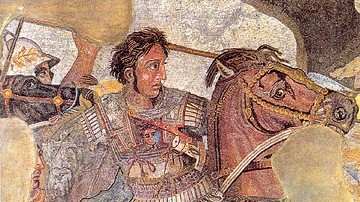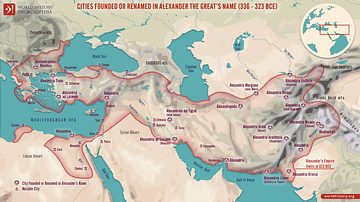Review

| Rating: | |
|---|---|
| Title: | The Greeks: Lost Civilizations |
| Author: | Philip Matyszak |
| Audience: | General Public |
| Difficulty: | Medium |
| Publisher: | Reaktion Books |
| Published: | 2018 |
| Pages: | 208 |
Matyszak’s book is full of engaging historical narration, clearly reflecting deep knowledge of various regions and time periods. Even so, he boils the complexities down so that general readers can comprehend the historical and political circumstances. As such, I highly recommend this volume to general audiences and public libraries.
Unlike most histories of ancient Greece, Philip Matyszak's book primarily focuses on Greek history which occurred outside of the Greek mainland. His story begins by describing Greek ideas, individuals, and politics before Alexander the Great, emphasizing how Greeks were spread throughout the ancient Mediterranean. The second chapter describes Alexander's movement from Macedonia, through Mesopotamia, and to India, illuminating how the demeanor of Alexander and others shifted in the duration of his campaign and the various people groups against whom he fought. With Alexander's death as a turning point, Chapter Three describes the complex succession of power that resulted in the Seleucid, Macedonian, and Ptolemaic empires. Here, Matyszak highlights how Greek discoveries and scholars were spread throughout the Hellenistic world, from Mesopotamia to Spain.
In Chapter Four, he offers a general overview of the political and military history of the Seleucid Empire, especially emphasizing how they sought to incorporate various people groups via Hellenistic ideology. Chapter Five focuses east of the Seleucid Empire, towards the Macedonian and Ptolemaic empires, in particular how the Ptolemies established Egypt, especially Alexandria, as a center for the Greek world. Chapter Six, then, describes the fall of these empires.
Chapter Seven outlines how Greek culture impacted Roman architecture, philosophy, language, and the rise of Christianity in the 1st century CE. Chapter Eight points to the Byzantine Empire as the last major stronghold of the Greek world, only to be destroyed in the 15th century CE by the Ottoman Turks. For Matyszak, this symbolized the end of the Greek world. Punctuating the legacy of the Greek world, the Epilogue identifies various ways in which the Greeks impacted and continually impact the world. He suggests, “the Greek legacy has become an integral part of a Western-based culture” (190).
Overall, Matyszak's book is full of engaging historical narration, clearly reflecting deep knowledge of the complex history of various regions and time periods. Even so, he boils the complexities down so that the audience, namely general readers, can comprehend the historical and political circumstances. Moreover, The Greeks is especially unique in that it primarily emphasizes the role that Greeks played outside of Greece proper, clearly illuminating how widespread Greek populations were throughout the ancient world.
With regard to criticism, two issues stand out. First, he could have provided more depth concerning the role of Greeks in Mesopotamia. Though it is not a flaw, The Greeks would be enriched by the inclusion of how Greeks are presented in cuneiform texts from the periods discussed in the book. Second, though Greece undoubtedly influenced the modern West significantly, he pushes the conclusion too far by commenting that “In a sense, today we are all Greek” (190). While Greek ideas did influence the West significantly, we should be careful not to marginalize other cultures throughout history who impacted the West.
Seeing that Matyszak is a teacher at the Institute of Continuing Education with the University of Cambridge, his voice in presenting history is a welcome addition to books oriented towards general audiences, Matyszak being both an informed and engaging author. As such, I highly recommend The Greeks: Lost Civilizations to general audiences and public libraries.
About the Reviewer
Bibliography
- Barrett, A. A. "Reviewed Work(s): The Sons of Caesar: Imperial Rome's First Dynasty by Philip Matyszak." The Historian, Vol. 70, No. 4 (2008), pp. 838-839.
- Coro P. "Kislīmu Day 10, Year 31, Seleucus and Antiochus the Kings." Greek Elements in Babylonian Sources, edited by Antonetti, C. and Biagi, P. Oxbow, 2017
- Grayson, A. K. Assyrian and Babylonian Chronicles. Eisenbrauns, 2000.
- Moore, R. "Reviewed Work: The Enemies of Rome: From Hannibal to Attila the Hun by Philip Matyszak." The Classical Outlook, Vol. 82, No. 4 (2005), p. 162.
- Sherwin-White, S. M. "Ritual for a Seleucid King at Babylon?." The Journal of Hellenic Studies, Vol. 103 (1983), pp. 156-159.
Cite This Work
APA Style
Brown, W. (2019, April 30). The Greeks: Lost Civilizations. World History Encyclopedia. Retrieved from https://www.worldhistory.org/review/211/the-greeks-lost-civilizations/
Chicago Style
Brown, William. "The Greeks: Lost Civilizations." World History Encyclopedia. Last modified April 30, 2019. https://www.worldhistory.org/review/211/the-greeks-lost-civilizations/.
MLA Style
Brown, William. "The Greeks: Lost Civilizations." World History Encyclopedia. World History Encyclopedia, 30 Apr 2019, https://www.worldhistory.org/review/211/the-greeks-lost-civilizations/. Web. 17 Apr 2025.




